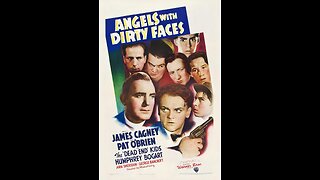Premium Only Content

The Letter (1940) | Directed by William Wyler
"The Letter" (1940) is a film noir and drama directed by William Wyler, featuring an acclaimed performance by Bette Davis as Leslie Crosbie. This adaptation of W. Somerset Maugham's play also stars Herbert Marshall as Robert Crosbie, Leslie's husband, and James Stephenson as Howard Joyce, the lawyer. The movie was released on November 22, 1940, and is often praised for its atmospheric direction, gripping performances, and the moral complexities it explores.
The 1940 version of "The Letter" is set on a rubber plantation in British Malaya, similar to its 1929 predecessor. The plot kicks off with Leslie Crosbie shooting and killing a man named Geoffrey Hammond. Initially, Leslie claims the killing was in self-defense against an attempted rape. However, as the story unfolds, it's revealed that Leslie and Hammond had an affair, complicating her defense and unraveling a web of lies, deceit, and guilt. The discovery of a damning letter Leslie wrote to Hammond becomes central to the plot, as it could incriminate her if revealed in court.
Bette Davis delivers one of her most memorable performances as Leslie Crosbie, infusing the character with a complex mix of vulnerability, cold calculation, and desperation. The film's direction by William Wyler is masterful, with expert use of lighting and shadow that enhances the story's suspenseful and foreboding atmosphere. The screenplay by Howard Koch adeptly translates Maugham's play into a compelling narrative that delves deep into themes of infidelity, redemption, and the facade of respectability.
The supporting performances, especially by Herbert Marshall and James Stephenson, are strong, contributing to the film's overall impact. The cinematography and the score further elevate the tension and emotional depth of the story.
While the 1940 adaptation is widely regarded as a classic of the film noir genre, some critics might argue that the film's adherence to the Production Code of its time led to a less explicit exploration of its darker themes, particularly regarding sexual infidelity and moral ambiguity. Compared to modern standards, the portrayal of colonial Malaya and its native inhabitants can be seen as stereotypical and reflective of the era's racial attitudes.
The 1940 version of "The Letter" is generally considered superior to the 1929 adaptation, mainly due to its more sophisticated direction, stronger performances, and the advantages of improved sound and film technology. Bette Davis's portrayal of Leslie Crosbie is often singled out for its depth and intensity, contrasting with Jeanne Eagels's performance in the 1929 version, which, while highly regarded, was limited by the early sound technology and the more static cinematography of the time.
The 1940 film benefits from William Wyler's direction, which brings a new level of nuance and visual style to the story, taking full advantage of film noir elements to create a more atmospheric and psychologically complex film. Additionally, the screenplay adaptation and character development in the 1940 version provide a more detailed and engaging narrative.
In conclusion, while the 1929 "The Letter" is an important piece of cinema history with a standout performance by Jeanne Eagels, the 1940 adaptation by William Wyler, featuring Bette Davis, is often cited as the definitive version, praised for its artistic achievements and enduring legacy in film noir.
-
 1:37:17
1:37:17
Classic Films & Movies Archive
5 days agoAngels with Dirty Faces (1938) | Directed by Michael Curtiz
197 -
 2:44:28
2:44:28
Barry Cunningham
4 hours agoPRESIDENT TRUMP TOURS JEROME POWELL SCENE OF THE CRIME AT THE FEDERAL RESERVE
30K12 -
 1:25:14
1:25:14
Sarah Westall
3 hours agoBlackmail, Power & Corruption: The Currency of the Empire - Epstein & more w/ Joachim Hagopian
20.4K6 -
 16:33
16:33
Clownfish TV
8 hours agoLate Night TV Has NO FUTURE After Stephen Colbert's Cancellation!
4K9 -
 45:56
45:56
The White House
3 hours agoPresident Trump Visits the Federal Reserve
31.6K22 -
 36:14
36:14
Kimberly Guilfoyle
4 hours agoRussia Hoax Reality Check, Live! | Ep240
29.4K10 -
 11:02
11:02
Preston Stewart
8 hours ago $0.61 earnedThailand–Cambodia Clash Erupts
10.5K3 -
 LIVE
LIVE
LFA TV
22 hours agoLFA TV ALL DAY STREAM - THURSDAY 7/24/25
746 watching -
 1:07:35
1:07:35
vivafrei
5 hours agoWall Street Journal DOUBLING DOWN on Epstein! Lawyer in Canada DEBANKED! AND MORE!
110K35 -
 4:42:20
4:42:20
Donut Operator
8 hours agoI'M BACK/ CRIME/ GAMEBOY CAMERA CHAD
106K5